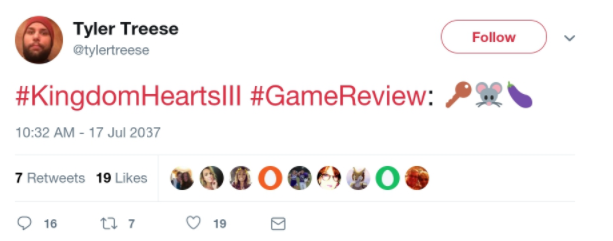There has been a lot of discussion lately as to the value and relevancy of written criticism. While I don’t agree that YouTube will be the death of traditional games coverage, I do believe that written game reviews will become irrelevant sooner rather than later. When the coroner examines the corpse of the games criticism, he’ll note on the toe tag that the death was caused by emoji.
Emojis. Everyone loves them. When I go to a restaurant now, I don’t write a 500-word review on Yelp. Instead, I just send out a simple message on social media that conveys all of my feelings in less than 140 characters. A simple message like “Nico’s pizza = ![]() and the waitress?
and the waitress? ![]() ” better conveys my thoughts than if I had ran through my meal and actually discussed what I liked about my experience. It doesn’t matter that my meal was brought out on time, and my water with lemon was consistently filled. What matters is that the service was kept 100. Everyone understands the simplified elegance of emojis, and that’s exactly why it’ll make criticism obsolete.
” better conveys my thoughts than if I had ran through my meal and actually discussed what I liked about my experience. It doesn’t matter that my meal was brought out on time, and my water with lemon was consistently filled. What matters is that the service was kept 100. Everyone understands the simplified elegance of emojis, and that’s exactly why it’ll make criticism obsolete.
After all, there’s a lot of confusion when it comes to written reviews. This is due to that dreaded subjectivity and how every site uses a different review scale (and trust me, if I’m not even bothering to read the review I’m not looking at the scale). Thankfully, there’s no confusion when it comes to emojis. Everyone knows that the ![]() is the highest praise that can be given out, and there’s never any confusion as to when to use it. Nobody would ever use the cat heart eyes emoji on something I dislike. Plus, it’s not like a gun will appear as a water gun on one device and as a pistol on another. There’s more consistency in emojis than there’ll ever be with review scales.
is the highest praise that can be given out, and there’s never any confusion as to when to use it. Nobody would ever use the cat heart eyes emoji on something I dislike. Plus, it’s not like a gun will appear as a water gun on one device and as a pistol on another. There’s more consistency in emojis than there’ll ever be with review scales.
Plus, who has time to read 1,200 words of thought out criticism? The only time I sit down to read something is when I’m on the john, and that barely leaves me with enough time to scroll through the last 20 minutes of my Twitter feed. Analysis needs to be communicated more efficiently, and that’s why emojis are the answer. I could catch up on an entire month’s worth of games in less than five minutes if all I had to do was read 30 emoji-filled tweets.
So, what will games criticism look like in 20 years? Well, I’m sure all focused websites will cease to exist in their current form, and we’ll only be browsing Twitter and Tout (which will have surely have a rebirth akin to a phoenix and replace the void in our lives that Vine left). Here’s an example of what my review of Kingdom Hearts III will look like when it actually releases in 2037:

Now that all subjective criteria is gone, criticism has finally been perfected. As you can see above, my hit game review of Kingdom Hearts III has appealed to the masses and managed to get nearly 20 likes. That’s actually a lot in 2037 since 99% of the world’s population died out in the Great Tragedy of 2030, but that’s a story for another time.
I shouldn’t have to explain the thought provoking prose of my Kingdom Hearts review since emojis are the only universally recognized language, but for a laugh I’ll expand on what it means. The first emoji, a key, serves to sum up the game’s plot. Attempting to explain the Kingdom Hearts lore in mere words would take an entire book, but I can use one simple emoji to get across that it features keyblades and all of the anime twists that fans love. The second emoji, the mouse, represents that Mickey Mouse is the highlight of the PlayStation 7 launch title. Finally, the aubergine expresses that the game may not be what the fans had wanted, but deep down it’s what they needed.
Look, emojis are fantastic. They’re a fun way to communicate in an ever changing landscape where people are constantly connected to the internet. They won’t ever replace long-form written criticism, though just like video content, they’ll continue to coexist alongside it. Criticism is what helps make art matter. As io9’s Evan Narcisse wonderfully summed up on Twitter, it exists “to guide, enlighten, amplify or challenge ideas in a given work.”
Gaming criticism is still young. It’s still evolving, there’s a lot of areas to improve upon, and we’re finally getting to the point where reviews aren’t merely used as a purchasing guide. There’s certainly value to discerning the general quality of a game (especially when they cost $60 a pop), but it’s equally important that people explore their own personal experiences and share them. Why does a game evoke an emotional response when played? All of this needs to be examined, and thankfully gaming is such a popular medium that plenty of outlets can do both. Art won’t evolve if not challenged, and the true genius of a game can’t be fully appreciated at a base level.
If there’s one thing I’m confident about, it’s that criticism will always remain relevant and serve an important purpose.








